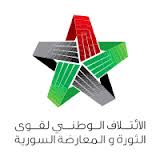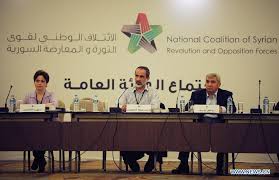 Syria’s fractious opposition scrambled to agree a new leadership on Friday in a bid to present a coherent front at peace talks which the United States and Russia are convening to seek an end to more than two years of civil war.
Syria’s fractious opposition scrambled to agree a new leadership on Friday in a bid to present a coherent front at peace talks which the United States and Russia are convening to seek an end to more than two years of civil war.
A major assault by President Bashar al-Assad’s forces on a rebel held town over the past week is shaping into a pivotal battle. It has drawn in fighters from Assad’s Lebanese allies Hezbollah, justifying worry that a war that has killed 80,000 people would cross borders at the heart of the Middle East.
Washington and Moscow have been compelled to revive diplomacy by developments in recent months, which include new reports of atrocities, accusations chemical weapons were used and the rise of al Qaeda-linked fighters among rebels.
U.S. Secretary of State John Kerry and Russian Foreign Minister Sergei Lavrov will meet privately in Paris on Monday to discuss their efforts to bring Syria’s warring parties together, U.S. and Russian officials said.

Russia said the Syrian government had agreed in principle to attend the planned peace conference, which could take part in Geneva in the coming weeks, and had “expressed readiness” to find a political solution.
Under intense international pressure to resolve internal divisions so it can play a meaningful role in the talks, Syria’s Western-backed opposition National Coalition met in Istanbul to elect new leaders and broaden its membership.
Senior opposition figures said the coalition was likely to attend the conference, but doubted it would produce any immediate deal for Assad to leave power – their central demand.
“We are faced with a situation where everyone thinks there will be a marriage when the bride is refusing. The regime has to show a minimum of will that it is ready to stop the bloodshed,” said Haitham al-Maleh, an elder statesman of the coalition.
There was more heavy fighting on Friday in Qusair, a town controlling access to the coast which Assad’s forces and Hezbollah allies have tried to take in a battle that could prove an important test of Assad’s ability to withstand the revolt.
Assad wants to secure the coastal region which is the homeland of his Alawite minority sect, an offshoot of Shi’ite Islam. He is backed by Shi’ite Iran and Hezbollah against mainly Sunni rebels supported by Saudi Arabia and Qatar.
The Syrian Observatory for Human Rights, a pro-opposition London-based monitoring group, said Syrian army and Hezbollah forces at Qusair were trying to cut off rebels in the nearby village of Hamidiya. State media said the army had destroyed “terrorist dens” in Hamidiya and also killed eight “terrorists” in another village, Daba, close to Qusair.
COALITION STRUGGLES TO AGREE
Much to the frustration of its backers, the coalition has struggled to agree on a leader since the resignation in March of respected cleric Moaz Alkhatib, who had floated two initiatives for Assad to leave power peacefully.
Alkhatib’s latest proposal – a 16-point plan which foresees Assad handing power to his deputy or prime minister then going abroad with 500 members of his entourage – won little support in Istanbul, highlighting the obstacles to wider negotiations.
“He has the right to submit papers to the meeting like any other member but his paper is heading directly to the dustbin of history. It is a repeat of his previous initiative which went nowhere,” a senior coalition official said.
Washington threatened on Wednesday to increase support for the rebels if Assad refused to discuss a political end to the violence, a sentiment echoed on Friday by British Foreign Secretary William Hague, who has been pressing the European Union to amend a weapons embargo to allow arming the rebels.
“We do think it is important ahead of any negotiations … for the Assad regime to understand that the pressure on it will intensify in the absence of successful negotiations,” he told a news conference in Jerusalem.
Concerned by the rising influence of Islamists in the rebel ranks, Washington has pressured the opposition coalition to resolve its divisions and to expand to include more liberals.
“The international community is walking a little faster than the opposition. It wants to see a complete list of participants from the Syrian side for Geneva and this means that the coalition has to sort its affairs,” a European diplomat said.
Looming large over the Istanbul meeting, which began on Thursday, is the shadow of Saudi Arabia, which according to opposition sources will lead an Arab drive to back the new government financially, after differences with Qatar on how to deal with the coalition were largely settled.
Saudi Arabia is backing a proposal being debated at the three-day meeting to expand the 60-member coalition to 95 by bringing in members of a new liberal political bloc being set up by veteran opposition campaigner Michel Kilo.
The coalition is currently dominated by two blocs: the Muslim Brotherhood and its allies in the Syrian National Council, and a faction loyal to Mustafa al-Sabbagh, a businessman close to Qatar.
“The Kilo bloc, if it is admitted, will end the era of the coalition being decided by Sabbagh and the Brotherhood,” a senior coalition source said.
Criticism has mounted against the coalition for failing to provide a credible democratic alternative to the four-decade family rule of Assad and his father.
Assad has vowed to defeat what he calls terrorists and foreign agents behind the uprising, which began with months of peaceful protests and evolved into an armed revolt after months of military repression.
More than 80,000 people have been killed in what is now a full-scale civil war that has dragged in Lebanon’s Hezbollah guerrillas and is spilling into other neighboring countries.
Burhan Ghalioun, a strong candidate to become the new head of the opposition, said the coalition was likely to agree to go to Geneva because it did not want Assad to gain political advantage from the meeting, although, he said, it was unlikely to produce any deal for a transition of power.
Other possible candidates include Ahmed Tumeh Kheder, a prominent opposition campaigner from the eastern province of Deir al-Zor, which borders Iraq’s Sunni Muslim heartland; Louay al-Safi, a professor who has taught in the United States; and acting coalition president George Sabra, a Christian who led pro-democracy demonstrations early in the uprising.
Reuters

Leave a Reply
You must be logged in to post a comment.